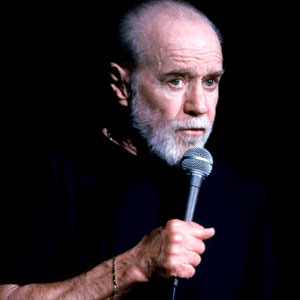 Paul Schiraldi
Paul SchiraldiGeorge Carlin loved words—the good, the "bad," the "filthy."
The iconic stand-up comic, whose routine about the seven words "you can't say on television" was heard from college campuses to the Supreme Court, died today of heart failure at a Los Angeles-area hospital, his publicist announced. He was 71.
Carlin, who suffered his first heart attack at age 41, was admitted to St. John's Hospital in Santa Monica earlier today after complaining of heart trouble, the statement said. He died at 5:55 p.m.
Note: The following clip features language some readers may find offensive?and that nearly all George Carlin fans will find appropriate:
Much more than a "footnote in legal history," as Carlin often referred to himself for his role in the seven "filthy" words case, the comic was the first-ever host of Saturday Night Live, a four-time Grammy winner and a touchstone for generations of writers and performers.
Carlin was due to receive the 11th Mark Twain Prize for American Humor in November. The honor was announced just last week, around the time of his final performances, at the Orleans in Las Vegas. According to his website, he had dozens of shows booked through the end of the year.
If there was one thing Carlin wasn't, it was the retiring type.
"Yes, I've accomplished all the things I've wanted to and way more, I couldn't have really predicted some of the paths," Carlin told Salon in February. "But I know that there's a restlessness, you know, artists are never finished."
Born May 12, 1937, in New York, Carlin celebrated his 50th anniversary in show business last year.
"I loved to watch Danny Kaye in the movies," he told Variety for a piece marking the anniversary. "I thought I'd be an actor. I'd start by being a deejay, then a comedian, then I'd get into the movies."
Aside from failing to become a noted song-and-dance performer, à la Kaye, Carlin pretty much kept to the plan.
He worked in radio, segued to nightclubs—at first, with partner Jack Burns—made it to TV and, eventually, found work as an actor.
For a figure who would become revered by the counterculture, Carlin's early TV and film work was downright conventional. He guest starred on That Girl. He had a part in a Doris Day family comedy, With Six You Get Eggroll. Of his work in the latter, Carlin wrote on his website, "Acting sucks a little less, but only a little."
Comedy clubs and comedy albums were where Carlin, who saw himself as a writer above all, flourished. A clean-cut solo act starting in 1962, by the end of the turbulent decade, he was getting fired in Las Vegas for uttering the word "ass" on stage. By 1970, he was bearded, and ready to take off—his look, conventional wisdom-questioning routines and unflinching devotion to all words, no matter how many letters, a perfect match for the times. By 1972, he was playing Carnegie Hall and getting busted for "disturbing the peace" with his mouth at a concert in Milwaukee. In 1973, he won his first Grammy, for his album FM and AM.
It was a cut off another album, Occupation Foole, however, that gave Carlin his most noteworthy achievement.
A listener hearing New York's WBAI-FM play Carlin's "Filthy Words" routine on Oct. 30, 1973, in its unaltered entirety lodged a complaint with the Federal Communications Commission. The FCC, in turn, threatened to pull WBAI's license. WBAI appealed the FCC's bark all the way to the Supreme Court, where in 1978, the justices ruled in favor of the FCC, agreeing that the seven words "you can't say on television," shouldn't be said on the radio, either—not during hours that children might hear them. The battle lines for future Howard Stern wars had been drawn.
"It's a perverse badge of honor to be the only comedian whose routines were the subject of a case in the United States Supreme Court," Carlin told the A.V. Club in 2005.
Officially indecent, though not obscene, Carlin loomed larger than ever. His appearance on the first SNL in 1975—he performed stand-up only, and didn't participate in the sketches—served as the show's stamp of underground approval.
Through a 1970s cocaine habit, and a second heart attack in the 1980s, Carlin kept working, in showrooms, on late-night TV shows and in HBO specials, the final and 14th of which, George Carlin—It's Bad for Ya!, aired this year.
In the 1990s and 2000s, Carlin returned to Hollywood as a revered elder statesman—a revered elder statesman with an always-young mind. He appeared in the Bill & Ted movies, earned two Daytime Emmy nominations for the children's show Shining Time Station and starred in a short-lived sitcom, The George Carlin Show. He found a kindred spirit in Kevin Smith, and vice versa, and appeared in three of the filmmaker's dialogue-driven comedies: Dogma, Jay and Silent Bob Strike Back and Jersey Girl.
In 2006, he was deigned suitably family friendly for Disney/Pixar's Cars and was asked to voice the Volkswagen burnout, Fillmore.
Offstage, Carlin's life, drug escapades excepted, was, in a word, square. He was married to his first wife, Brenda, from 1961 until her death in 1997. He was married to his second wife, Sally Wade, until his death.
His commitment to words was more than square, it was whole. To Salon some months ago, he talked about a comic novel, and a nonfiction book of reminiscences he hoped to write.
"If I get the shot to do that, that'd be great. You've always got to have something next," Carlin said. "You've always got to have something out there that's worth going for."
(Originally published June 22, 2008 at 10:10 p.m. PT.)